← Go back
Landscape of Health Tech: A Personal Odyssey in Digital Wellness
Written by Olena Tkhorovska on November 16th, 2023
Olena Tkhorovska on November 16th, 2023
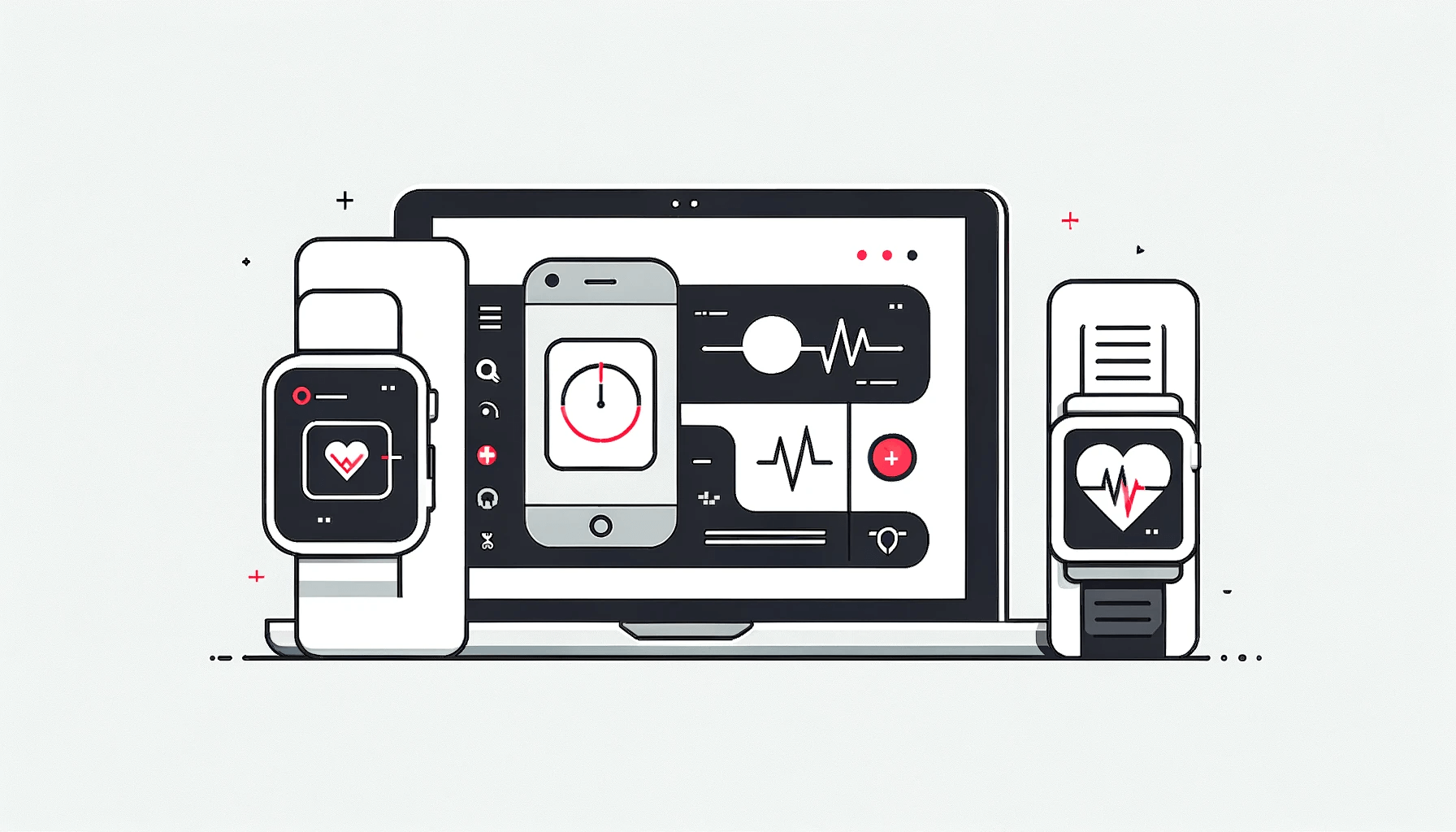
Pieoneers Software is an expert in health and wellness app development. The company has the tech expertise, and the team is genuinely motivated to help bring innovation to preventative health and the healthcare system. The illustration shows smart wearable devices, sensors, and digital health platforms that collect, store, and process information, providing AI-powered health insights.
Delving into the health tech universe has been quite an adventure for me. As someone deeply passionate about my health and technology's transformative power, I've seen how apps can reshape our wellness journeys.
Each app I've encountered has enriched my daily routines and signalled the vast potential and growing trends in health tech development.
Revolutionizing Wellness with Wearable Tech and Apps
Consider the seismic shift introduced by wearables like the Fitbit and Apple Watch. They are not just gadgets. They are personal wellness companions, providing real-time insights into our heartbeats, sleep quality, and workout intensity. Integrating with powerhouse apps like Apple Health or MyFitnessPal, they offer a panoramic view of our health data, nudging us toward smarter lifestyle choices.
The innovation doesn't stop there—devices like the Oura ring track one's sleep, changes in body temperature, and HRV. CGM (continuous glucose monitor) devices monitor changes in blood glucose. This is critical for anyone with diabetes. At the same time, it can be highly informative for someone with a healthy metabolism to see what effect specific nutrition or workouts have on one’s blood sugar levels.
Moreover, smart devices with insights into blood are instrumental in chronic condition management—and not just CGMs. A few companies are working at the edge of innovation and trying to create a potassium tracking sensor. This technology will revolutionize care for people with chronic kidney disease. These tools propel us toward a future where proactive health monitoring is the norm.
AI: The Personal Health Consultant in Your Pocket
The leap into AI has been equally exhilarating. Apps like Ada Health feel like having a personal health consultant, always ready to dissect symptoms and offer insights. I love that they named their app after Ada Lovelace, the first-ever computer programmer.
Healthily is the leading medically approved platform promoting self-care. It's an AI-driven app designed to meet unique user needs by merging smart AI tools with reliable insights.
Let's not overlook the personal touch brought by genetic testing apps like 23andMe, which open doors to personalized health narratives. Even our mental well-being is getting a tech boost from apps like Woebot, a prime example of how AI and cognitive-behavioural therapy can join forces for mental health care.
Boosting Engagement and Compliance
There's also a fun side to this tech revolution. Gamification turns mundane tasks like taking pills or using a spirometer into rewarding challenges.
The Mayo Clinic is turning complex medical information into engaging, digestible content. And for managing medications, Medisafe's intuitive interface is a godsend. Meanwhile, Teladoc and Telus Health have made consulting with healthcare providers as easy as FaceTiming a friend, proving that technology can draw us closer, even from a distance.
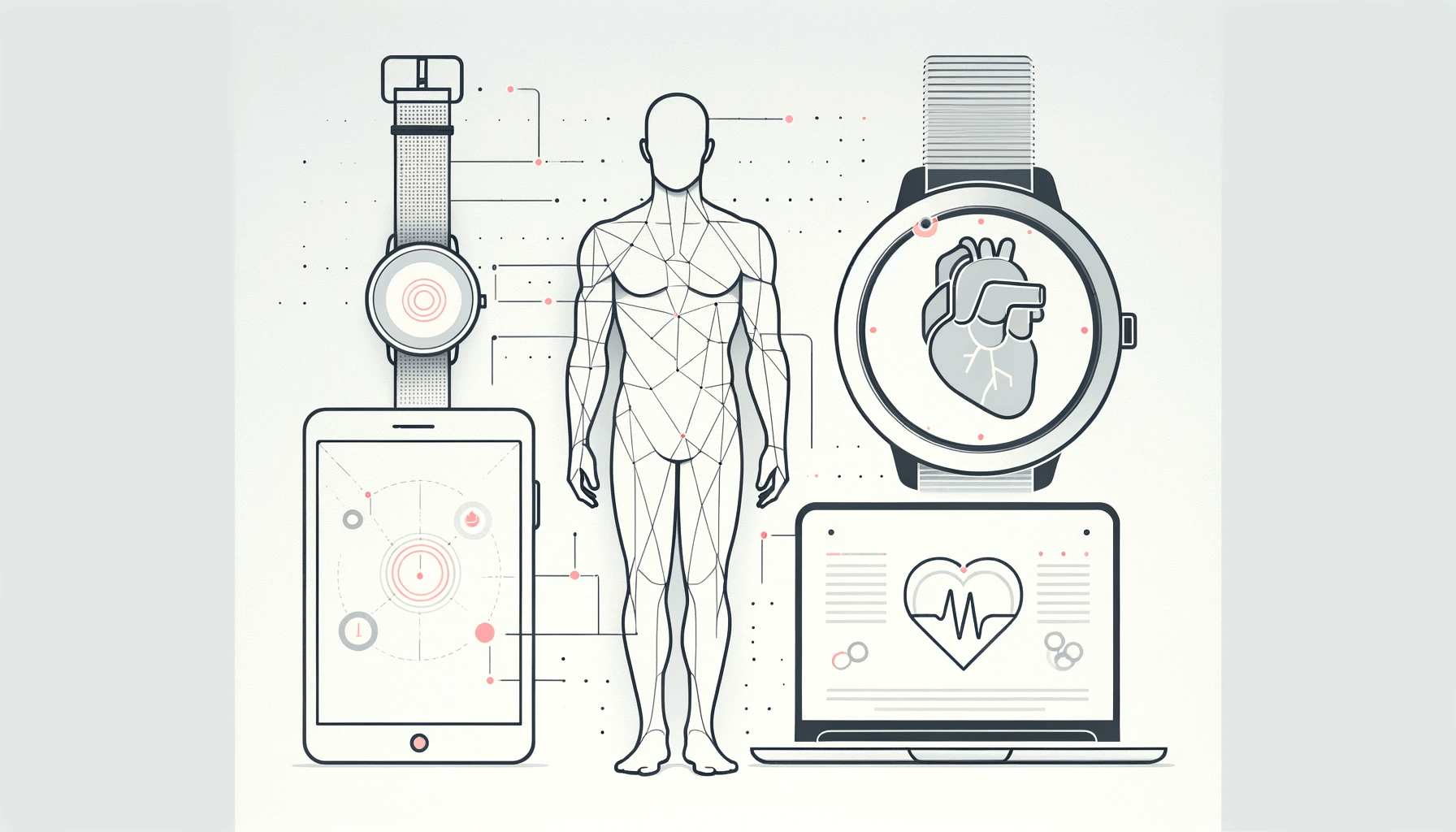
As a leading app and web development company, Pieoneers is actively exploring the integration of health applications with AI, especially focusing on preventative health and lifestyle that has a tremendous effect on healthspan. The illustration shows an outline of a human body and health data being collected and viewed on smart medical and health devices driving innovation in healthcare.
Harnessing Big Data for Preventative Health
I've watched big data evolve into a crucial health ally. Projects like Google Health uncover patterns capable of predicting illnesses before they manifest. With the Oura ring, the app will let me know if I’m about to develop a cold.
Health Catalyst is another trailblazer, using predictive analytics to spotlight individuals on the cusp of health issues, allowing for timely interventions. The convergence of big data and health tech is not just reshaping individual care—it's influencing entire health policies.
Dr. Andrew Huberman discusses with Mark Zuckerberg and Dr. Priscilla Chan about AI's role in revolutionizing healthcare, CZI's disease cure initiatives, and Meta's tech impact on mental health and human experiences.
A Personal Tech-Wellness Narrative
Over a few years of my health journey, I made a habit of using a handful of health and fitness apps every day. Oura–for sleep tracking. MyFitnessPal–as my food diary.
Strava is one of my favourite apps, and here's why: it's more than a fitness tracker; it's a community. It's a health-enabling social network where shared goals and achievements are the norm.
And speaking of community, I'm proud to have been part of the Pieoneers team that developed the Jevitty App. Jevitty's insights into bone density and muscle mass are instrumental in helping one understand their long-term health. They bring a game-like zeal to adopting a healthy lifestyle, proving that when tech meets fitness, the result is not just fun—it's transformative.
Oura Ring: Mastering Sleep with Smart Technology
My journey with the Oura Ring, a smart ring that tracks sleep and activity, has been transformative. Over five years, it has helped me develop healthy sleep habits, providing detailed sleep analysis that enriches my understanding of rest and its impact on overall health.
MyFitnessPal: Harnessing the Power of Data in Nutrition
MyFitnessPal has been instrumental in my nutrition management for two years. Its functionality allowed me to analyze my dietary habits deeply, paving the way for an AI-driven future in nutritional tracking. And I don't care about the calories (sorry MyFitnessPal team), although this seems to be the most important metric; I care about my meal timing and the fibre. The fibre metric is one of the easiest parameters for me to ensure I eat whole foods with none to minimal processing. This trick works miracles for gut health, which is another exciting topic. And I look forward to innovations in gut health apps and devices.
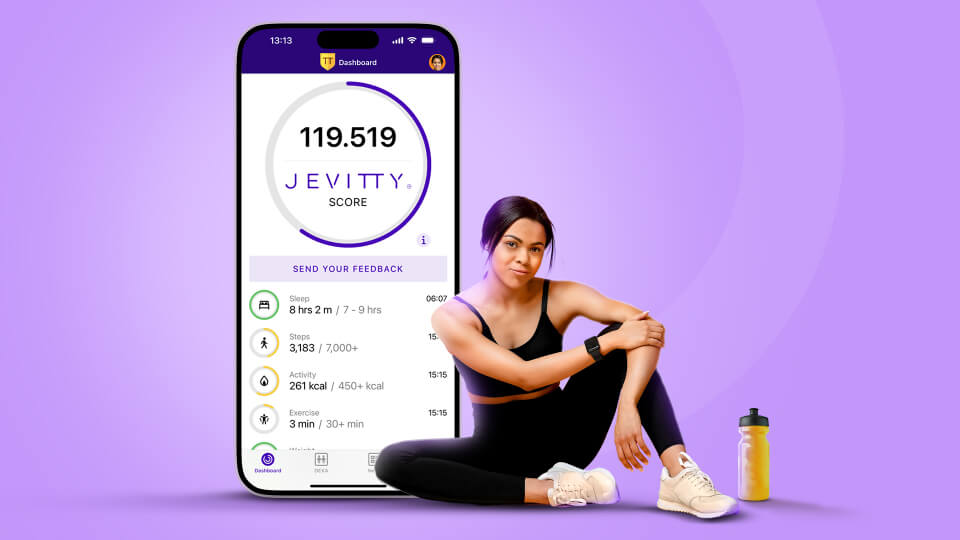
Jevitty App: A Holistic Approach to Health and Fitness
As part of the Pieoneers team, I contributed to developing the Jevitty App. Its aim to gamify a healthy lifestyle, coupled with its integration with smart wearables and DEXA scanning, highlights the potential of technology in creating comprehensive health solutions. Read Jevitty case study.
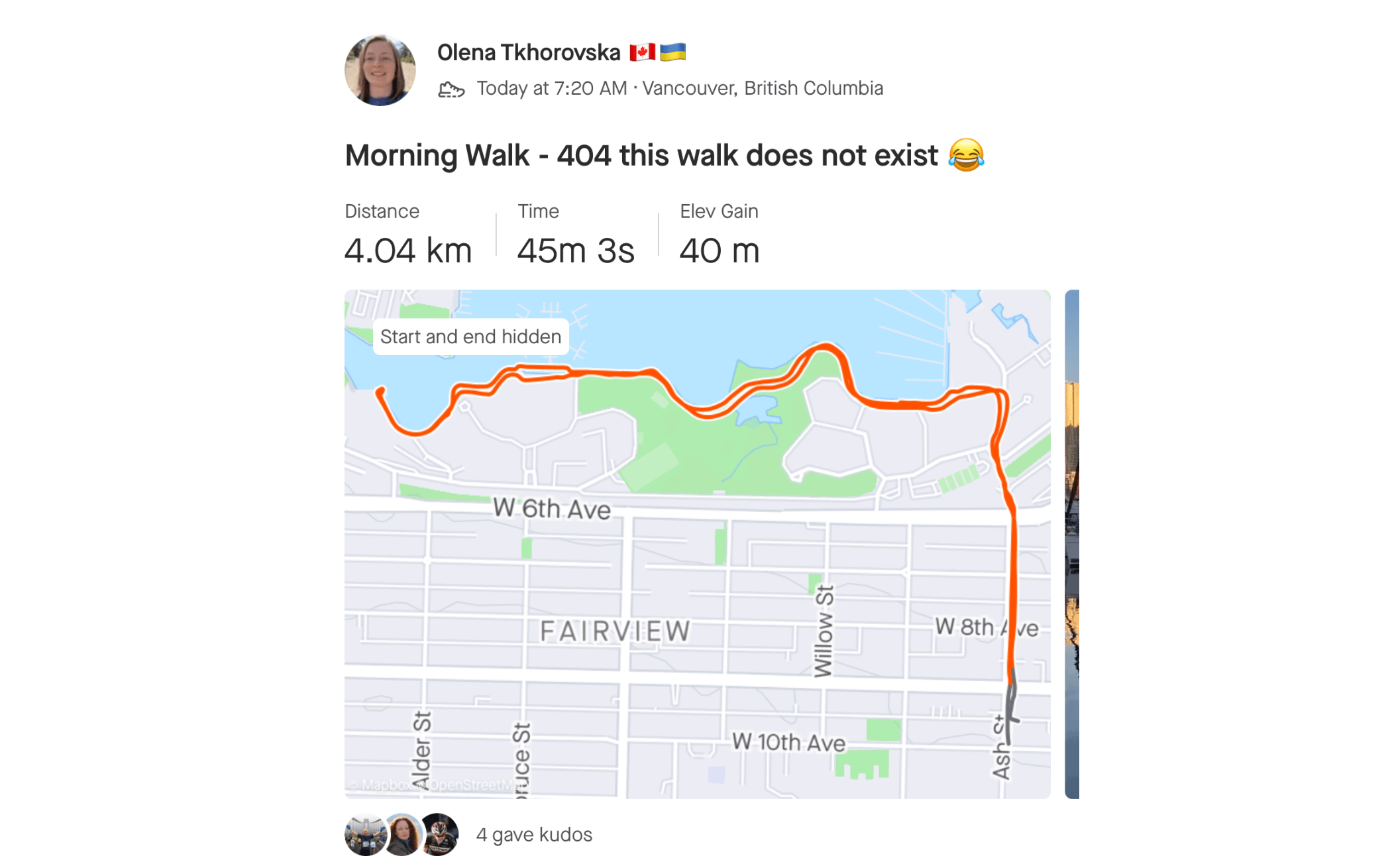
Strava is fun to use. The community engagement always motivates you to go out there and hit the ground with your running shoes.
Strava: Creating a Community for Fitness
Strava stands out as a health-enabling social network. The community it fosters has been crucial in maintaining my active lifestyle, showcasing the power of social connections in promoting fitness.
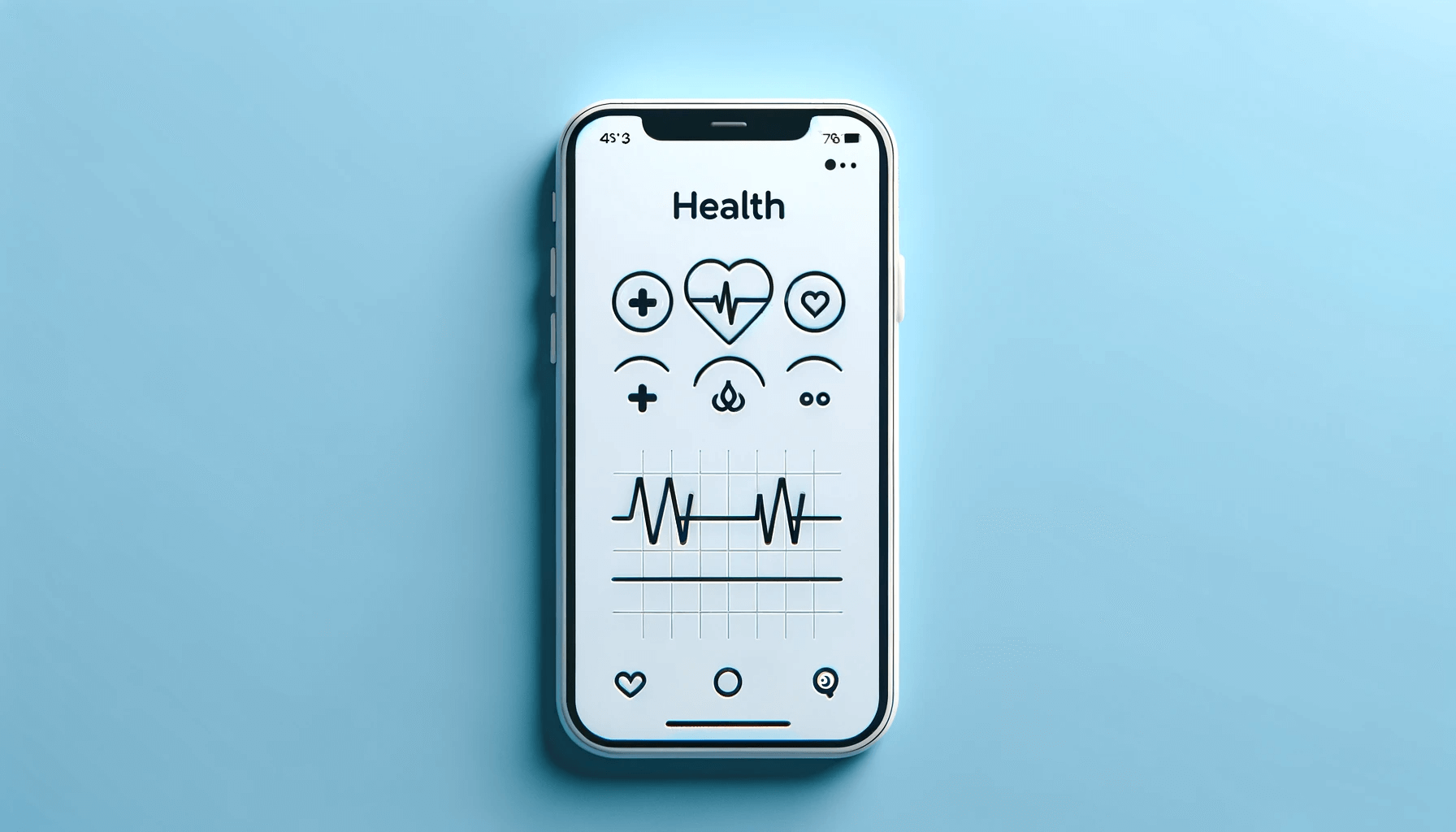
Health application sketch made with Dall-E featuring sleep, activity, nutrition, and glucose metrics with a minimalistic design, health icons, and clean space.
FreeStyle Libre CGM Sensor and App
I recently explored my metabolic health using the FreeStyle Libre CGM for a two-month period. The app’s functionality was satisfactory but lacked interface sophistication and data presentation.
This experience was a valuable peek into my health, underscoring the potential of integrating glucose monitoring with sleep, physical activity, and detailed meal tracking.
Dr. Peter Attia’s insights on CGM in non-diabetics further illuminate this. His research suggests even those perceived as metabolically healthy can benefit from CGM data. This underscores a pressing need for health apps that consolidate various wellness dimensions, offering a more nuanced view of personal health and advancing proactive healthcare management.
Technology Challenge of Encompassing Health App
The tech challenge of building an encompassing health data app is non-trivial. Some of the questions to ask here will be a) technology platform, b) data security, and 3) AI integration.
Native vs cross-platform. In one of our posts, we compare Flutter and React Native. While Flutter is leading in the cross-platform sector, native Swift (iOS) and Kotlin (Android) tech remain the undisputed leader for building industry-leading applications with superior user experience and security. To ensure a necessary level of data security, one must consider lucrative reasons for launching on a BaaS like Firebase.
The Road Ahead in Health Tech
As I reflect on my health tech odyssey, it's clear that our apps are more than just tools—they are gateways to better living. They each offer a lens to view and enhance our health, help us build strength and develop good habits. Moreover, the revolution in health will happen from both ends–prevention and treatment.
With the AI capabilities available now, I think we’ve only scratched the surface of the possibilities of a tech-driven wellness approach. With AI integration, smart wearables, and community-building platforms like Strava leading the way, the road ahead in health tech is not just promising—it's exhilarating.
Pieoneers Software is a Health tech and AI development company.
Unlock the Potential of AI and App Solutions for your Health and Life Sciences Business

Olena Tkhorovska
CEO